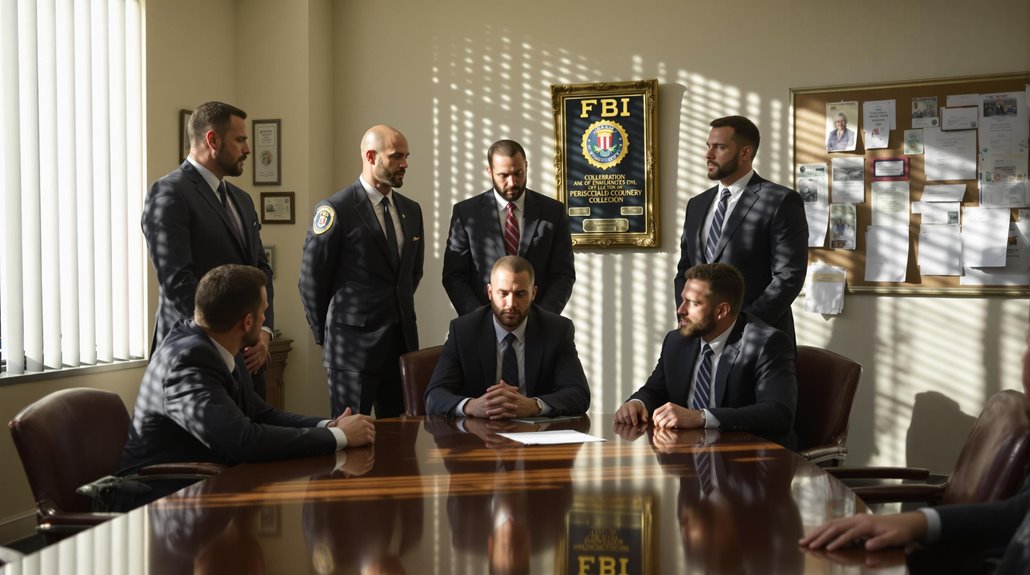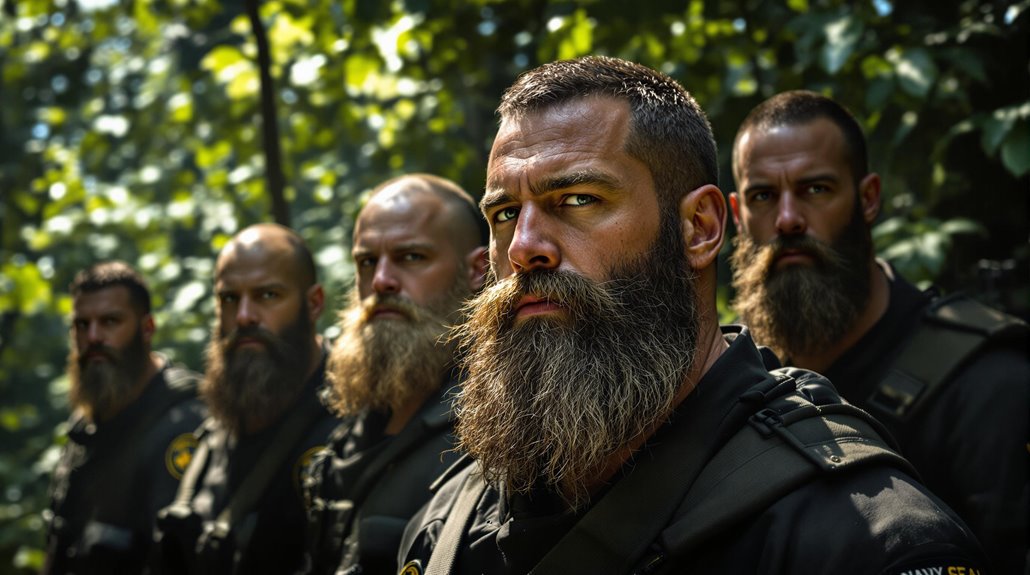Did Ancient Spartans Have Beards?
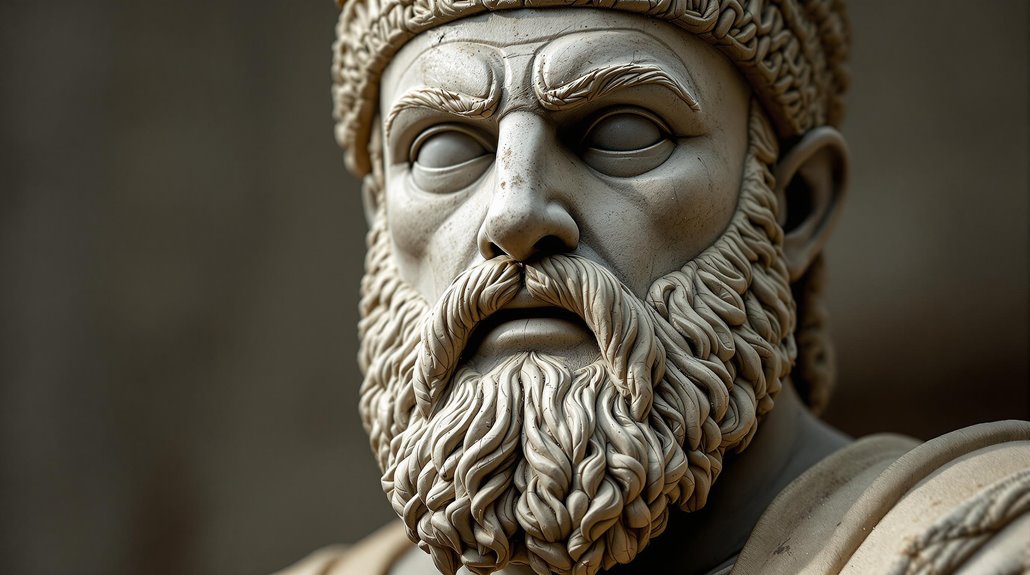
Yes, ancient Spartans typically had beards. In their society, a lush, well-groomed beard symbolized masculinity, wisdom, and status. In fact, if a Spartan acted cowardly, they'd have half their beard shaved off as a sign of diminished honor. But it wasn't all about looking good — these warriors also kept their upper lip clean-shaven to prevent enemies from grabbing their facial hair in combat. So, while they decked out in war gear, their grooming habits were similarly strategic. Stick with Spartan history and you'll uncover even more fascinating aspects of their lives — from their rigorous training to their everyday experiences.
Grooming in Ancient Greece
In Ancient Greece, lush full beards symbolized both masculinity and wisdom. Grooming in ancient Greece, particularly in Ancient Sparta, was more than just an aesthetic choice, it was a reflection of societal values.
Traditionally, Spartans favored beards but often went without mustaches, as revealed in numerous artistic depictions from the time. Spartans were known for their strict grooming standards linked to military honor. For example, it was considered a severe humiliation to have half a beard, a punishment reserved for those accused of cowardice.
Spartan culture placed a significant emphasis on neatness and discipline, and this extended to personal grooming. From a young period, Spartan men underwent rigorous training that included maintaining their appearance. Before battles, careful attention was given to their hair and beards, a fact that highlights the importance they placed on grooming.
In a society where facial hair was not just a personal choice, but a reflection of societal values, Spartans demonstrated that grooming was an integral part of their culture. It showed discipline, honor, and above all, the Spartan spirit of perfection. Grooming in Ancient Sparta, consequently, was a practice steeped in tradition, discipline, and societal norms.
Spartan Masculinity and Beards
While you might think of long, unkempt beards when you imagine ancient warriors, the Spartans often sported short, well-groomed facial hair. This wasn't just a fashion choice. It was a cultural ideal representing the Spartan concept of masculinity, which emphasized discipline and grooming standards. You see, Spartan hoplites weren't just fighters; they were embodiments of Spartan values.
If a Spartan displayed cowardice, Plutarch noted, his punishment was to shave half his beard. You can imagine the humiliation and loss of honor this would bring. The beard was a symbol of bravery and dignity. Losing it partly meant losing these attributes in the eyes of society.
Spartan youths weren't left out of this tradition. They were subjected to strict grooming practices, including the annual shaving of mustaches. This wasn't some rite of passage; it was a demonstration of obedience and conformity to Spartan ideals.
The significance of beards in Spartan society was immense. They symbolized manliness, wisdom, and status, setting the Spartans apart from other contemporary cultures. So, if you're picturing a Spartan, remember - it's not just about the beard. It's about what that beard represents.
Depictions in Historical Artifacts
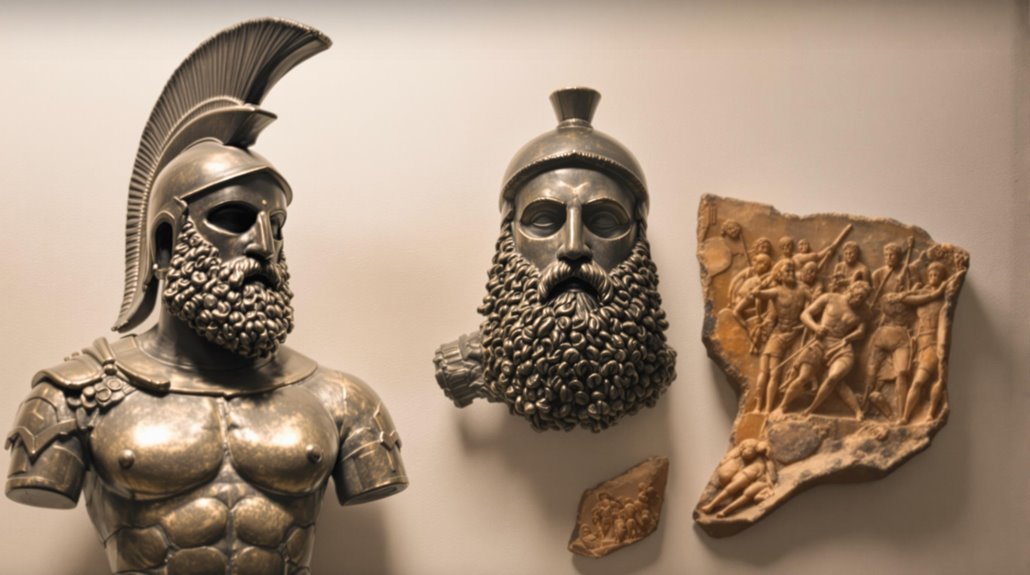
Looking at ancient Greek art, you'll often see male figures idealized with beards, a reflection of the societal norms that equated facial hair with masculinity and wisdom. Several ancient sources, including bronze statuettes from Laconian workshops, depict Spartan warriors with diverse facial hair styles, pointing to the commonality of beards among them.
Delve deeper into historical artifacts like pottery and sculptures, and you'll uncover that Spartan men typically sported short beards. These weren't just any beards, though. They were well-groomed, styled for practicality, and likely trimmed and maintained to align with the Spartans' disciplined culture. This is evident in artistic representations from the Classical period, where Spartan men are shown with short, neat beards.
However, there's one interesting aspect to note. Despite the prevalence of beards, mustaches aren't as prominent in ancient Greek art. This could suggest that while beards were accepted, mustaches might not have been as widespread among Spartans. So, while it's clear that beards were a part of Spartan culture, they were more than just a fashion statement. They were a symbol of masculinity, discipline, and wisdom.
Spartan Laws on Facial Hair
You might be surprised to learn that Spartans had specific traditions and rules when it came to facial hair. These rules were often intertwined with Spartas military culture and societal norms. This wasn't just about looking good, it was about discipline, uniformity, and to some extent, personal expression.
Take a look at these key points:
- Annual shaving of mustaches was a tradition. This wasn't only about grooming; it was a form of obedience training showing the society's emphasis on discipline.
- Spartan punishment for cowardice involved shaving half the beard, as noted by Plutarch. This shows how facial hair was culturally significant.
- Aristotle's writings suggest a focus on maintaining mustaches, indicating specific grooming practices.
- There weren't formal laws regarding mustaches. This implies the enforcement of grooming practices was more about personal authority of the Ephors.
- Artistic representations and historical artifacts depict Spartans with facial hair. However, the style and length were likely influenced by cultural norms and personal expressions.
In the world of Spartans, your facial hair wasn't just about individual style, it was a reflection of your adherence to societal rules and military discipline.
Influence of Spartan Military Culture
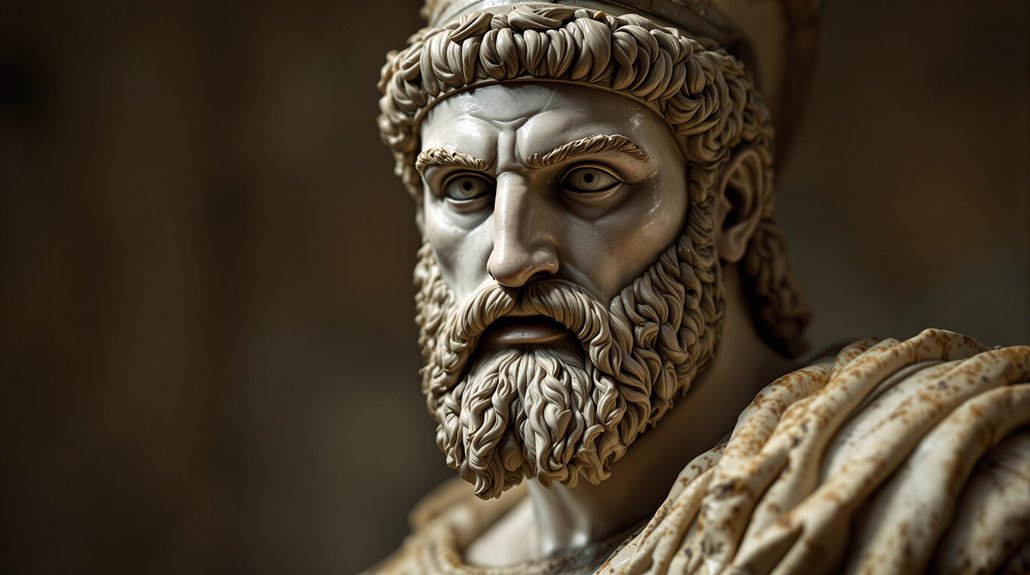
Spartan military culture's strict grooming standards extended to their facial hair. In Ancient Greece, a Spartan warrior's physical appearance was as vital as his combat skills. The annual shaving of mustaches was one such grooming standard, serving as obedience training and reinforcing discipline amongst the ranks. You'll find that short beards were preferred, not just for neatness, but for practicality in battle too.
Historical texts, like those of Plutarch, tell us that Spartans took pride in their grooming. This wasn't vanity, but rather a reflection of their ingrained values of discipline and communal identity. Even from an early stage, the Spartan agoge, a rigorous training program for youth, instilled these values. Physical conditioning and moral training went hand-in-hand, shaping not only their character but also their grooming practices.
Artistic representations from the period depict Spartans with well-kept hair and beards. This wasn't just about looking good. It was about projecting their warrior status, their adherence to societal expectations, and above all, their Spartan identity. So, while beards may seem a minor detail, they were an essential part of Spartan military culture in Ancient Greece.
Beards in Spartan Society
While military discipline shaped grooming habits in the battlefield, it also played out in the everyday lives of Spartans, particularly in their preference for beards. As an Ancient Greek society, Spartans held a distinct stance towards beards, viewing them as a symbol of masculinity, wisdom and dignity.
In Spartan society, your grooming practices were a reflection of values and identity. Here are a few key points to understand:
- Spartans typically sported beards, following the broader Greek cultural preference for facial hair.
- Spartan laws mandated the shaving of mustaches, a unique grooming practice indicating obedience.
- Artistic representations, including bronze statuettes, depict Spartans with varying beard styles.
- The historian Plutarch noted that Spartans groomed themselves before battles, suggesting a cultural pride in appearance.
- The emphasis on maintaining a well-groomed beard aligns with Spartan values of discipline and communal identity.
Shaving Rituals of Spartans
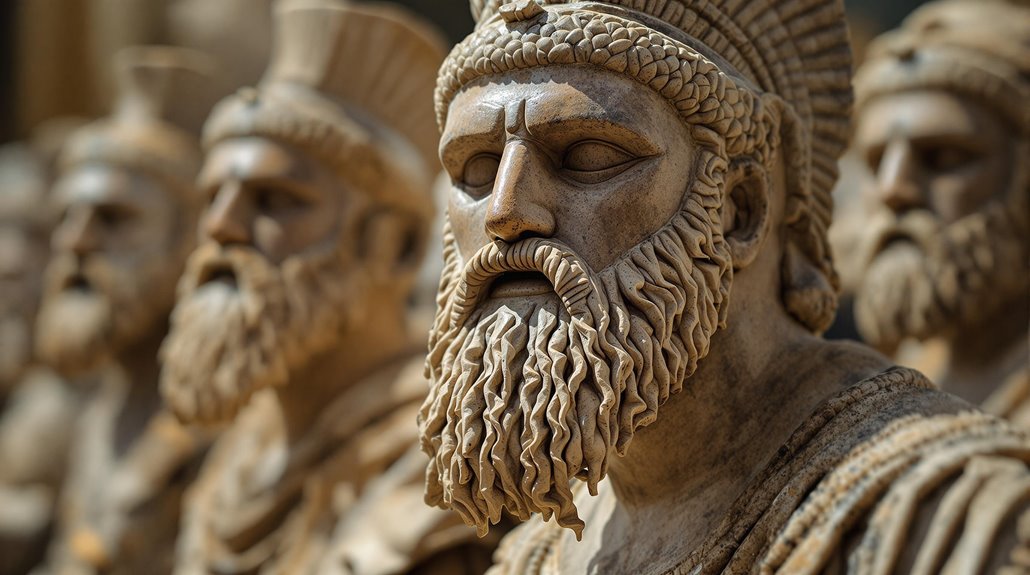
Grooming rituals, particularly those involving shaving, held a unique place in Spartan society. You see, the Spartans didn't just wake up and decide if they were going to shave. These ancient facial hair grooming standards were precisely enforced by the Ephors, powerful men who held sway over Spartan life.
Traditionally, Spartans shaved their mustaches. This wasn't a fashion statement, but a measure of discipline and obedience. Historically, the upper lip was kept clean-shaven as a strategic move. If you were a Spartan, you'd do this to prevent enemies from grabbing your facial hair in combat.
As a Spartan, failure in battle had severe consequences. Plutarch tells us that Spartans who showed cowardice or incompetence on the battlefield were punished by having half their beards shaved off. Imagine the shame of walking around with only half a beard!
In Spartan society, beards were a symbol of their warrior identity. Ancient art and bronze statuettes often depict Spartans with carefully styled beards, showcasing grooming as a significant part of their cultural identity. So, while they held a general preference for beards, the shaving rituals remained an integral part of their tradition.
Impact of Spartan Beards on Status
Moving into a more societal aspect, let's examine how these beards affected a Spartan's status. You see, in ancient Sparta, facial hair wasn't just about personal style or grooming preference. It held a much deeper significance, directly influencing one's place in society.
Here's how a Spartan's beard impacted their status:
- *Symbol of Manhood*: Beards were associated with masculinity. A full beard was a sign of maturity and readiness for military service.
- *Reflection of Honor*: The quality and maintenance of one's beard reflected their honor and discipline, with any negligence potentially viewed negatively.
- *Indicator of Experience*: The presence of a beard often indicated a warrior's experience in battle, enhancing their prestige among their peers.
- *Adherence to Tradition*: Beards were a symbol of adherence to traditional masculine ideals and societal expectations, reinforcing their importance in Spartan culture.
- *A Legal Requirement*: Spartans had laws that enforced grooming standards, including the annual shaving of mustaches, emphasizing the importance of facial hair.
Therefore, a Spartan's facial hair wasn't just a style statement, it was a direct reflection of their status within the warrior class.
Spartan Beards in Literature
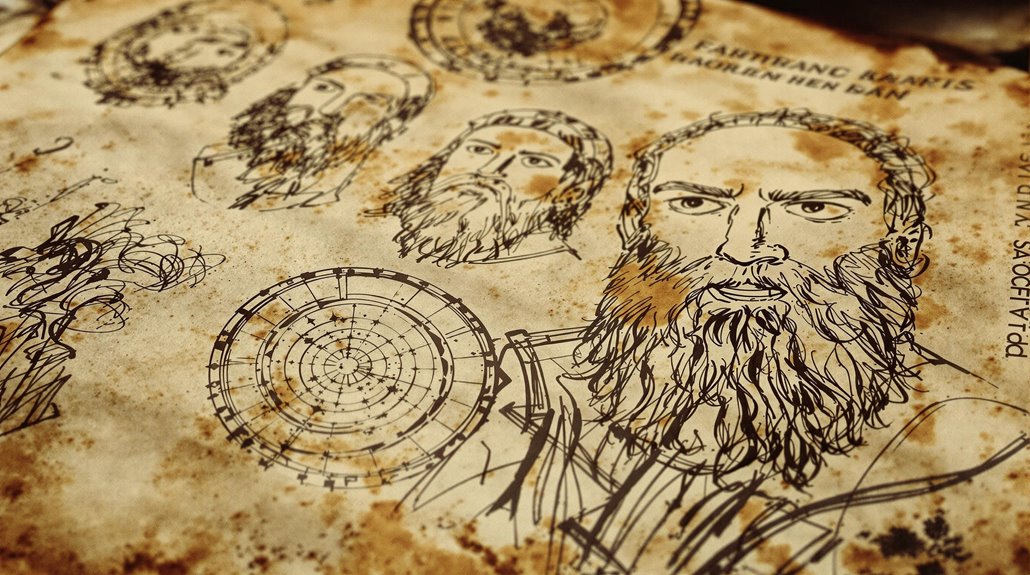
If you investigate ancient literature, you'll find that Spartan beards held significant sway. Literature from Ancient History, such as works from Plutarch, gives us a glimpse into the importance of beards in Spartan society. They weren't just a fashion statement, they were a symbol of masculinity and status.
Plutarch, an eminent scholar of his time, writes about how Spartan warriors would shave their mustaches as a punishment. It's clear that Spartans had a preference for beards without mustaches. This preference is further clarified by Aristotle's writings. He suggests that while Spartans surely sported mustaches, they made sure not to let them overgrow.
Artistic representations from Laconian workshops also provide a fascinating perspective. They depict Spartans with varying styles of beards, hinting at the cultural significance of beards and how they varied among individuals.
What's interesting is that there were no explicit laws governing mustache grooming in Spartan society. This implies that the enforcement of beard styles was likely influenced more by personal authority than codified regulations. It's a fascinating insight into the nuanced approach Spartans had towards facial hair grooming.
Evolution of Beard Trends
Ancient Spartan beard etiquette certainly gives us food for thought, doesn't it? This unique aspect of ancient culture reveals a fascinating progression of beard trends throughout history.
Initially, the ancient Greeks, including Spartans, were all about full beards, which symbolized wisdom and masculinity. Here's a quick snapshot of how beard trends evolved:
- Full beards were in vogue in ancient Greece, representing manliness and knowledge.
- Spartans held specific grooming rituals, such as annual mustache shavings, symbolizing discipline.
- Alexander the Great's influence shifted military grooming towards clean-shaven faces to prevent enemies from grabbing beards in battle.
- During the Hellenistic period, rulers' facial hair varied greatly, reflecting individual and cultural preferences.
- With Greek fashion influencing Roman elites, beards gradually fell out of favor with the upper classes, leading to Scipio Aemilianus initiating the daily shaving trend by the 2nd century BCE.
It's clear that beard trends were not just about aesthetics but also reflected societal norms, military strategy, and cultural exchange. The ancient Spartans' unique approach to facial hair offers a compelling glimpse into the evolution of beard trends.


